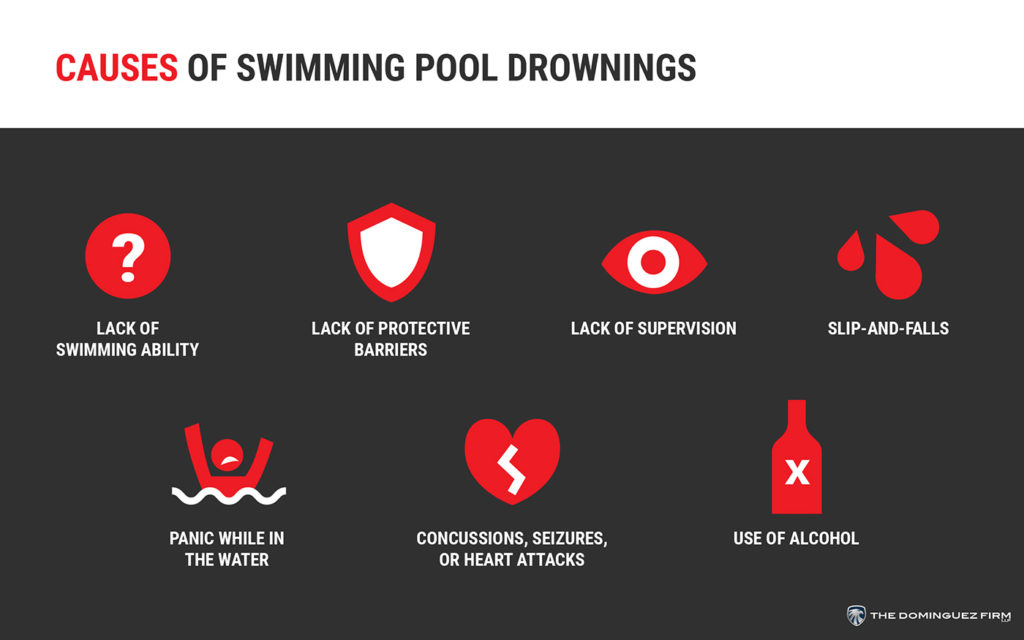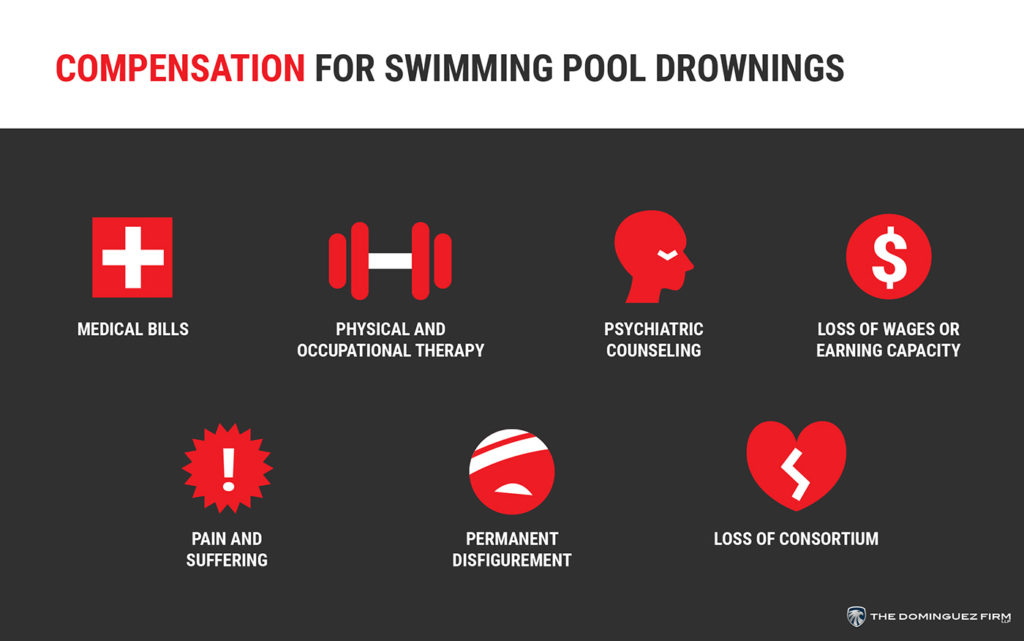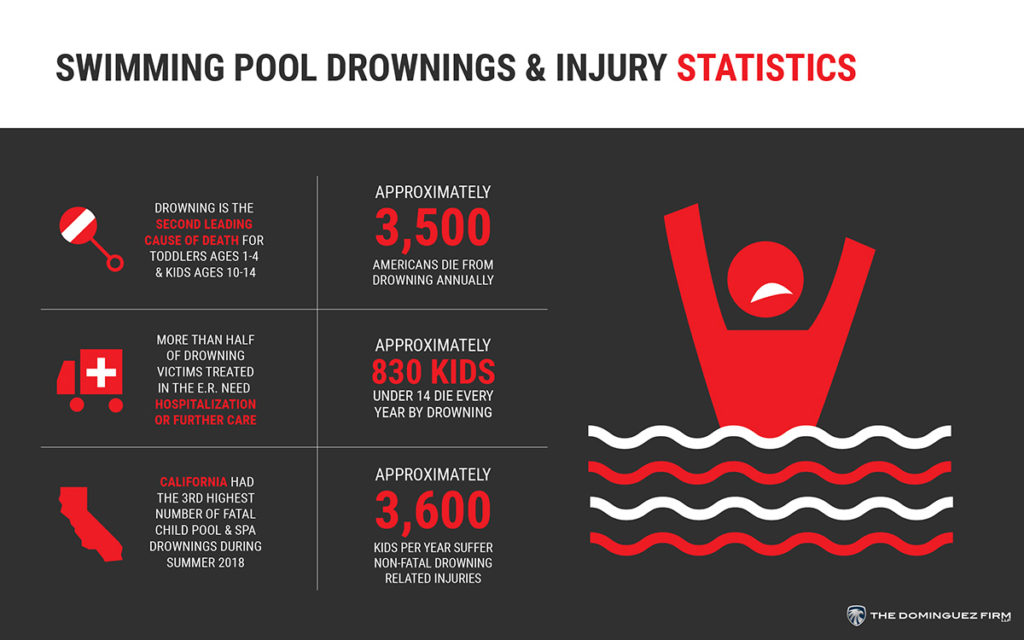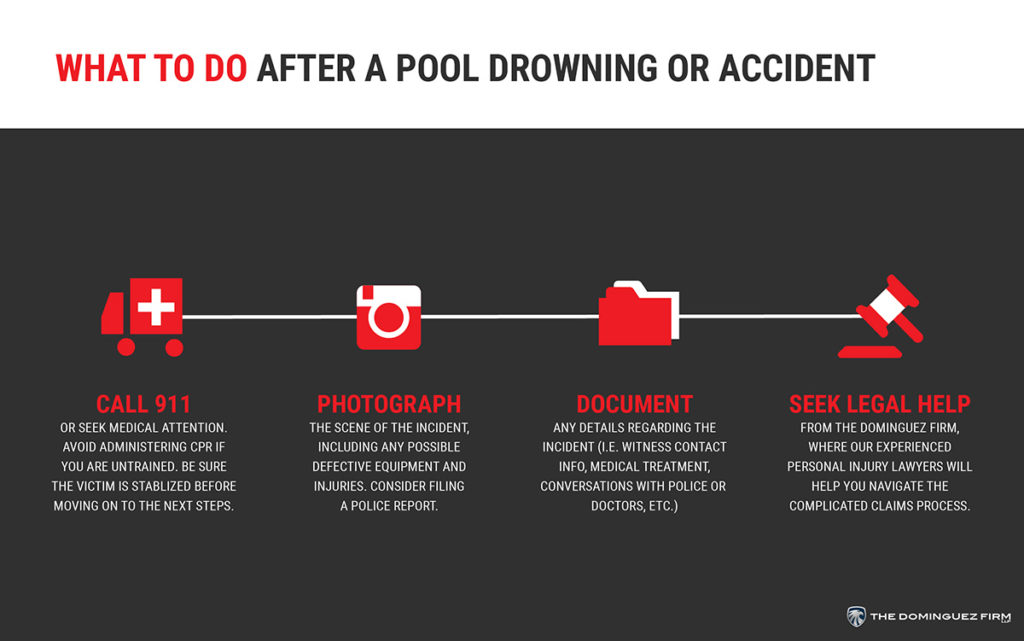There's nothing like a refreshing dip in a pool on a hot summer day in Southern California. But when people don't take the proper precautions, pools can also be extremely dangerous. Each year, thousands tragically die in pool drowning accidents. Even more troubling is that the youngest and most vulnerable in our society are substantially more likely to die in a drowning accident. Drowning is the leading cause of death among children under the age of 4, according to the CDC.
Many of these swimming pool drownings could been prevented if swimming lessons were more accessible and pool owners took proper safety precautions. Here’s what you need to know about swimming pool drowning, courtesy of the Los Angeles personal injury lawyers at The Dominguez Firm.
Who is Responsible for a Swimming Pool Drowning?
The question of legal liability for a swimming pool drowning depends on the specific facts of a given case. The first is determining who owns and operates the pool.
Privately Owned Swimming Pools
If the pool is privately owned, the pool owner may be liable for any injuries that take place in their pool under the personal injury law area of premises liability. Property owners have what is called a “duty of care” in relation to visitors to their property—in other words, they have a legal responsibility to ensure the safety of guests and take proper safety precautions to prevent accidents and injuries.
This duty increases when someone is on the property for the benefit of the property owner, for example if they are providing requested services like gardening or childcare. Likewise, property owners owe an extra duty of care when minors are invited to their property and must ensure that all children are adequately supervised when around the pool. If, for example, you invite your neighbors to a barbeque and one of their children accidentally drowns in your pool, you may face a lawsuit for negligence from the child’s parents.
In order to be successfully sued under premises liability, the plaintiff must show the pool owner was negligent in their duty of care to their guests. At the most basic level, negligence occurs when someone fails to do what a reasonable person should, in a given situation.
An owner may be found negligent if, for example, they failed to install fencing around their in-ground pool, they failed to provide adequate supervision to guests, or they did not properly maintain their pool.
Adults on the property who are not invited guests or service providers—in other words, trespassers—are generally not owed a duty of care by the property owner and are thus legally responsible for their own injuries while on private property. However, pools are considered an “attractive nuisance,” and pool owners owe a duty of care to minors even if they have accessed the property illegally. Private pool owners should take steps to prevent access to underage trespassers.
Communal Swimming Pools
Generally speaking, owners of communal pools on private property, such as those in gyms and private schools are subject to the same premises liability as residential private pool owners. However, many of these pool operators require guests sign a liability waiver as a condition of being granted access to the pool. Another common practice is for these owners to post signs stating that pool users waive liability, removing the need for guests to sign a paper waiver.
In certain circumstances these waivers are not legally enforceable. In general, guests cannot waive a pool owner’s liability for accidents resulting from gross negligence or recklessness on the part of the owner. For example, if the tiles along the edge of a pool were broken or loose, causing someone to fall in and drown, the victim's next of kin would have grounds to sue even if the deceased signed a liability waiver before entering.
The language in pool waivers should not deter someone injured in a swimming pool accident from taking legal action against those responsible. The same goes for surviving family members of someone who drowned in a swimming pool. If either of these scenarios has happened to you, consult with an experienced swimming pool drowning lawyer at The Dominguez Firm to decide how best to move forward.
Government Swimming Pools
What about government-owned pools, such as those operated by municipal parks or public schools? Government pools are held to the same standards of premises liability. However, the procedure is much different from filing a conventional lawsuit, including a stricter timeline, more paperwork and certain restrictions. Again, it is always best to consult with a personal injury lawyer before pursuing any sort of legal claim.

Causes of Swimming Pool Drownings
Swimming pool drownings can be caused by a variety of factors, most of which are entirely preventable.
Some of the most common immediate causes of swimming pool drownings include:
- Lack of swimming ability. Over-confident swimmers may exceed their physical capacities while untrained swimmers may not realize the risks involved. Most schools do not require swim education, and undeserved communities have limited access to public pools. This results in high numbers of non-swimmers which increases the risk of drowning, especially for members of these communities.
- Lack of protective barriers or fencing around the pool. Especially in the case of in-ground pools, children or inattentive adults may not see the pool and accidentally fall in.
- Lack of supervision. This is especially the case with young children who do not yet know how to swim. While you don’t necessarily need a licensed lifeguard on duty 24/7 at your home pool, you do need to be sure that someone always has their eyes on any children in the vicinity of the pool.
- Slip-and-falls. There's a reason lifeguards warn people not to run on deck. Decks are often made of materials that can be slippery when wet, putting victims at risk of hitting their heads. Such head trauma can cause loss of consciousness, which can significantly increase the risk of drowning.
- Panic while in the water. Very often, unconfident swimmers will panic while in the water. This panic can lead to hyperventilation and thrashing movements that increase the likelihood that the swimmer will inhale water or sink below the surface.
- Use of alcohol or other impairing substances around a pool. Most accidental drownings among adults and adolescents involve the consumption of alcohol. Alcohol impairs judgment, slows reaction times, and significantly impacts coordination and basic motor skills—all factors that significantly increase the risk of drowning.

Compensation for Swimming Pool Drownings
As with all personal injury claims, victims injured in non-fatal drowning incidents can expect to be compensated based on the severity of their injuries and any residual disability. In general, a victim can claim compensation for:
- Medical bills, including post-emergency follow-up appointments
- Physical and occupational therapy
- Mental health counseling
- Loss of wages
- Loss of earning capacity
- Pain and suffering
- Permanent disfigurement
- Loss of consortium (if the claimants injuries impact her ability to enjoy companionship, moral support, or intimacy with her spouse or domestic partner)
In incidents involving a drowning death, the victim’s family may file a wrongful death claim. A wrongful death lawsuit may claim compensation for:
- Funeral and burial expenses
- Income that the deceased would have earned, had they not passed away.
- Loss of support and companionship
- Pain and suffering
- Any medical bills the drowning victim had as a result of their accident
The legal team at The Dominguez Firm is experienced in handling swimming pool drowning cases and can advise you of your best options for pursuing legal compensation.

Swimming Pool Drowning and Injury Statistics
- A 2022 study by the Consumer Product Safety Commission (CPSC) shows that fatal and non-fatal drownings among children under 15 are still disturbingly high.
- There were, on average, 389 fatal pool drownings between 2017-2019 for the same age group.
- 73% of the children involved in fatal drownings were under the age of five.
- Two-thirds of fatal child drownings occur in residential pools and spas. This includes their own homes, or the homes of family, friends or neighbors.
- On average, there are 3,500 to 4,000 drowning incidents per year in the United States, resulting in approximately 10 fatalities every day.

What to Do After a Swimming Pool Drowning or Injury Accident
With any sort of accident resulting in traumatic injury, time is of the essence. The more quickly you act, the better the outcomes for the injury victim.
- Have someone call 911 immediately and ask if anyone knows CPR. If you are at a pool with a lifeguard, they will be trained in CPR and first aid. Do not administer CPR if you are untrained, as you may cause additional harm to the victim.
- Get contact information from everyone on the scene or who may have witnessed the incident. If the accident occurred at a public pool, file an accident report with the management. Take photos of the deck and pool area where the incident took place, including any possibly defects that may have played a part. Consider filing a police report, especially in cases of wrongful death or gross negligence on the part of the pool operator.
- Once the victim has been stabilized, document all pool accident injuries. Take photos of the injuries. Be sure to keep copies of all documentation you receive related to the victim’s treatment, including medical bills, diagnostic test reports, prescription information, emergency room records, etc. Try to keep notes on all conversations with doctors and other medical professionals, police officers, witnesses, and related parties.
- Contact an experienced swimming pool drowning lawyer right away. Be sure to provide your lawyer with the documentation outlined directly above.
- Don't talk to insurance company adjuster, especially once you hire the personal injury attorneys at The Dominguez Firm. Our attorneys bring decades of experience in personal injury litigation to the negotiating table and can help you to construct a strong legal claim, while navigating the complicated claims process for you.
What if the Injury or Drowning Occurs at a Family or Friend's Home?
An already difficult situation is made even more so when an accident occurs at the home of a friend or family member. Unfortunately, research shows guests at friends’ or family members’ pools are up to six times more likely to drown or injure themselves than at a public pool. This may be because we feel safe and familiar in these spaces and let our guard down.
So how should you handle the aftermath of a drowning injury that occurs at a friend’s or family member’s home? If it is the case that the property owner carries homeowner’s insurance, then their policy may cover accidental injuries on their property—though they may be less likely to cover wrongful death.
If they do not carry an insurance policy or their policy doesn’t cover the accident, and you are unable to come to a settlement privately, your only recourse to collect compensation would be through filing a legal claim. This, of course, presents unique challenges to your personal relationships.
Ultimately, the decision about whether to pursue a legal claim will come down to your personal judgment and situation. Should you choose to pursue a legal or insurance claim, consult with a personal injury attorney to find out how best to do so given the circumstances.
Help Proving Liability
Proving liability for a swimming pool injury accident is often very complex and typically includes proving negligence against a private individual or entity such as a gym.
If the drowning occurred in the pool of a public entity, such as a city swim center, then you must adhere to governmental rules, which have many short deadlines and pitfalls.
If you or a loved one has been injured or killed as a result of a swimming pool accident, please do not hesitate to call us for a free consultation at 800-818-1818. We are experienced swimming pool accident injury lawyers that will fight to get you the justice and compensation you deserve.
My experience was good. They made sure to kept me in the loop and made sure to let me know what was going on the whole time. My mom has used other attorneys and this experience was beyond better. I would definitely recommend them!
— Ashley Magana
The attorneys were always available and answered my questions. I would recommend them to anyone. Zoe is the best!
— Janet Salazar
My experience with The Dominguez Firm and the attorneys was really good. They were very informative and always returned my calls.
— Jocelyn Gonzalez
